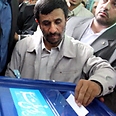
Voters split but turnout high in Iran election
Voting time extended after Iranians swarm ballots; analysts say big turnout could benefit moderate candidate, but all bets are off in charged elections
Iranian voters turned out in larger number numbers on Friday to choose a new president despite a limited choice of one relative moderate and three main hardline conservatives, with long queues forming outside polling stations.
Supreme Leader Ayatollah Ali Khamenei urged Iranians to participate in force in the vote, damning US officials who criticised the fairness of the election.
Related stories:
- Iran's polls open in presidential vote
- Reports: Iran may disqualify candidate over nuclear talk
- Iranian candidate quits to boost reformist chances
Interior Minister Mostafa Mohammad Najjar told state Press TV there had been a large turnout across the country in response to the leader's call.
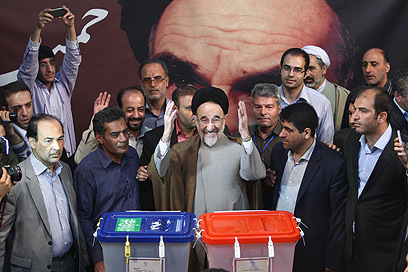
Former president Khatami at the ballots (Photo: AFP)
"They want to stand against the enemy," he said. Israel, the United States and their allies, who accuse Tehran of seeking to develop nuclear weapons, top Iran's list of foes.
The interior ministry extended voting time by several hours, Press TV said, due to the large number of voters waiting outside polling stations.
Iranian analysts said a big turnout could benefit the sole moderate conservative candidate Hassan Rohani, since some of his natural supporters in the urban middle class had been toying with abstention.
If no candidate wins an outright majority, a runoff pitting the two top finishers would take place June 21, so even a strong showing by Rohani in Friday's voting could face another test. Results are expected early Saturday.
Rohani's call to rehabilitate Iran's foreign relations and enact a "civil rights charter" has resounded with many Iranians eager for change.
But some reformists said they were still doubtful about voting after the experience of 2009 when reformist leaders said the election was stolen from them to return President Mahmoud Ahmadinejad to office. The government denied rigging the count.
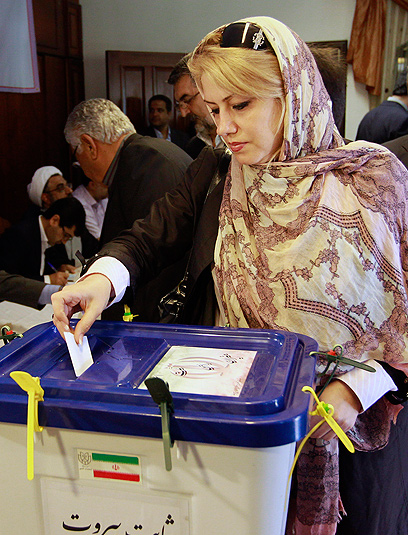
Iranian voter (Photo: AP)
"I am standing in line right now to vote. Making up my mind about voting or staying away was a struggle for me," said Shaqayeq, a student in Tehran. "Most reformists have urged us to vote and therefore I decided to vote too. For Rohani."
Mahnaz, a Tehran artist, was still agonizing.
"I am still not sure if I want to vote or not. I still remember what happened four years ago and that angers me," she said. "But a part of me still believes voting is important ... If I decide to vote I will vote for Rohani because he is the only moderate among the candidates."
Other reformists saw Rohani was the least worst option.
"I voted for Rohani even though he is not my true representative," said Sara, in upmarket north Tehran. "I am a reformist and at best he is only a moderate but I voted for him because he is the best we have got at this point."
"We love the system"
The failure of the hardline so-called "Principalists" to unite behind a single candidate could mean the conservative vote is split, raising the likelihood of a run-off in a week's time.
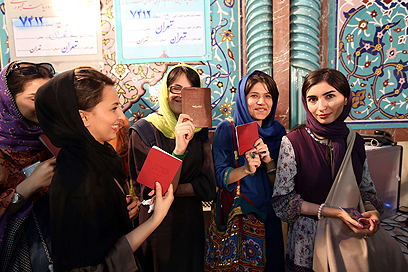
More voters (Photo: AFP)
With no independent, reliable opinion polls in Iran it is hard to gauge which way the ballot will go, let alone the extent to which Khamenei, the Revolutionary Guards and the Islamic Basij militia will exert their powerful influence over the vote.
One Basij militiaman, Hossein, 27, said he was voting for Saeed Jalili, Iran's chief nuclear negotiator who is alone among the candidates in defending Tehran's current uncompromising stance in talks with world powers and an ideologically driven foreign policy.
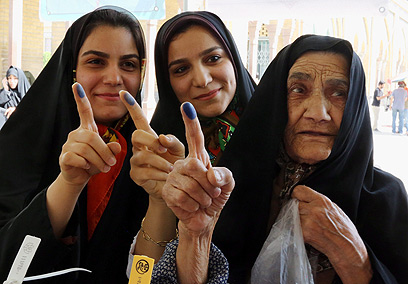
Voters displaying stained fingers, proving they voted (Photo: EPA)
"I will certainly vote for Jalili. He is the only one I can trust to respect the values of the revolution. The supreme leader trusts him so much that he leads Iran's nuclear negotiations," said Hossein in Tehran.
"Jalili is also the only candidate who won't be affected by international pressure on Iran," he said.
A young woman wearing a long black chador who declined to give her name also said she was voting for Jalili.
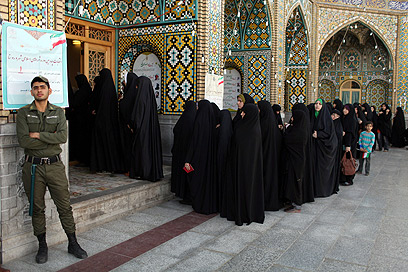
Women at entrance to ballots (Photo: AP)
"I voted to support the system. We love the system. God willing Mr. Jalili will be elected."
But others said they would vote for Mohammad Baqer Qalibaf, the mayor of the Iranian capital, due to his track record of improving transport and infrastructure in the sprawling city.
"I am voting for Qalibaf because he made a difference in Tehran," said Soroush, a 29 year-old student.
"He has worked hard since he became Tehran mayor and I think he is someone we can count on."
Even people from outside Tehran said they were impressed with the no nonsense, hard-working attitude of the mayor, a former national police chief.
"Qalibaf really built Tehran," Reza Sarvestani, 48. "I'm from the provinces, and when I travel to Tehran I'm amazed."
Supporters for the other main hardline contender, Ali Akbar Velayati, appeared thinner on the ground, but those who said they would vote for the former foreign minister said they had liked his pledge to improve Iran's foreign relations.
AP contribute to this report
- Receive Ynetnews updates directly to your desktop










